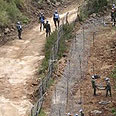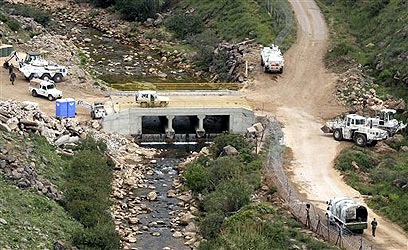
UN peacekeepers in Lebanon began on Friday erecting a barbed-wire fence along the border with Israel to prevent breaches of the Blue Line.
"UNIFIL soldiers began laying the barbed-wire fence in the area north of the (border) village of Ghajar," Yasmina Bouziane, spokeswoman for the United Nations Interim Force in Lebanon, said.
A military source confirmed the details and said that the works being conducted on the Israeli side of the border were coordinated with the IDF in advance.
A military source confirmed the details and said that the works being conducted on the Israeli side of the border were coordinated with the IDF in advance.
Over 2,000 people live in Ghajar, but though two thirds of them reside on the Lebanese side, they all possess Israeli ID cards and are considered full citizens.

UNIFIL troops in northern Ghajar (Photo: AP)
A spokesman for the village, Najib Hatib, said that residents did not know what works where being done in the northern part of Ghajar but noted that they were being conducted near the local stream. "There are pumps there that provide water to all the residents and we object to this attempt to prevent us from reaching them and maintaining them. We are not politicians and we have no intention of getting into the reasons that led to the construction of the fence.
"We demand of the Israeli government, the UN and the Lebanese government to take us into consideration and understand that this water is our source of life. If our access to the pumps is blocked, a large amount of our water supply will dry out."
Volatile border
The decision to set up the barrier was made on April 2 at a meeting between UNIFIL commander General Claudio Graziano and officials from Lebanese and Israeli armies, Bouziane said.
The three parties agreed that UNIFIL would set up the barrier north of Ghajar "in order to prevent violations of the Blue Line," Garziano had said then.
"The prevention of drug trafficking in the area is also one of the goals of the barrier," Bouziane said.
There have been only few incidents along the border since the end of the 2006 war between Israel and
Lebanon's Shiite Hezbollah militia.
A Lebanese drug trafficker was killed and another wounded by Israeli soldiers in February.
UNIFIL, which was created in 1978 after an Israeli invasion of southern Lebanon, saw its mission extended by UN Security Council resolution 1701 which ended the 34-day conflict in August 2006.
AFP contributed to this report















